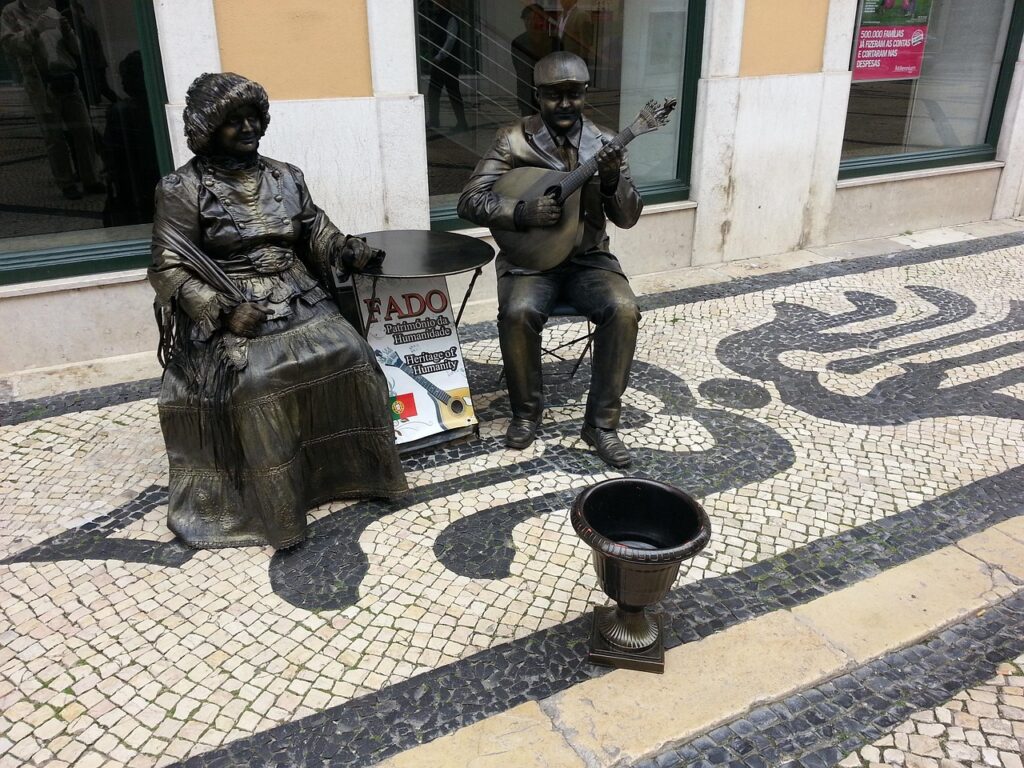Ryan’s Take:
We weren’t supposed to be there.
The plan was drinks with Ana and her cousin near the waterfront—normal, tourist‑adjacent, tiled‑wall stuff. But the tram broke down. And Liam decided it was urgent to photograph an alley cat that “looked philosophical.” We wandered uphill, got weirdly quiet, and ended up in front of a place that smelled like wine corks and old seafood. Faded green door. Poster peeling off the wall. “Claudina sings Amália (maybe) – tonight.”
Inside was dim. Not romantic dim. Dim like someone had stolen light and never given it back. There were five tables, none matching. Everyone stared like they already knew each other or were all in a secret club. The bartender said nothing. Just poured us vinho verde like he’d done it every night for forty years.
Claudina was already singing when we sat down. No mic. No spotlight. Just her, a cigarette in her left hand, and a voice like broken silk. Not pretty—beautiful in a way that hurt. Every syllable hung heavy. Her mouth didn’t smile, but her voice did things to the air. You could feel people clenching glasses just to stay grounded.
Then came the blackout.
Total. Not a flicker or a dimmer fade. Just snap—dark. A few startled laughs. A single phone lit up near the door, then vanished. But Claudina didn’t stop. She didn’t even pause. She walked between the tables, kept singing, louder. No reverb, no polish. Just soul, naked.
And that’s when Liam elbowed his glass.
Full red wine, directly into the lap of the man next to us. An old guy with perfect posture and a moustache that probably had rules of its own. I braced for a slap or a shouted insult. But the guy just blinked, looked down, smiled this weird peaceful smile, and handed Liam a battered mandolin.
Liam’s Take:
I hate mandolins.
Not the instruments themselves—just the memory of being dumped in Galway by a redhead named Niamh and spending a month trying to impress her cousin with poorly fingered trad ballads. I hadn’t touched one since.
But now I was holding one. And Claudina, still singing with the power out, turned to look at me. She didn’t nod or say anything. She expected. Which is worse.
I plucked. Badly. Then less badly. Somehow muscle memory kicked in, or the wine numbed my shame receptors, and I found a rhythm. She moved closer, still singing. Our sounds stitched together. It wasn’t good, technically—but it worked. The crowd leaned in, not smiling, just absorbing.
Ryan, predictably, tried filming it.
A man slapped his phone down and hissed, “No phones. This is soul.” Classic.
It felt like the longest five minutes of my life. I played until my wrist cramped, and Claudina closed her eyes on the last note like she’d been singing to someone who wasn’t there.
And then… silence.
Big, fat, holy silence. People sat in it. Like it was dessert.
Ryan Again:
We walked home in the dark. No streetlights. The Bairro Alto cobbles did their best to snap our ankles. Neither of us talked much. There’s something about music like that—it stays inside you, echoes around your ribs.
We left Lisbon two days later. Autopilot’s still dead. Liam accidentally lobbed the flare gun into the marina. We’re currently steering by instinct, salt, and sarcasm. Next stop was meant to be Sines.
But we might just drift for a bit.

